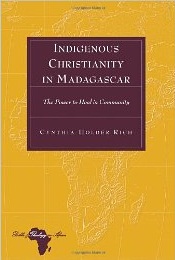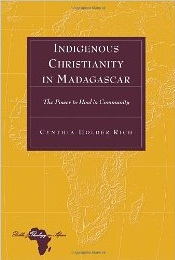THE BOOK – Research, Faith, Power, and Unemployment’s Gifts
 Indigenous Christianity in Madagascar: The Power to Heal in Community
Indigenous Christianity in Madagascar: The Power to Heal in Community
by Cynthia Holder Rich (Peter Lang 2011)
I am happy to announce that my new book is now in print. I have spent some years studying the work of the Fifohazana, or Awakening, movement of Madagascar, an indigenous Christian movement with a vocation for healing ministries. As in all research projects where a scholar delves more deeply into ground already explored in some ways, it could be said that research for this volume began when I moved to Madagascar in 1998, as we soon heard of and witnessed the ministry of the Fifohazana. My research continued during doctoral study at the University of KwaZulu-Natal in theology and development, and through work on an edited volume of essays on different aspects of the movement and its ministry (The Fifohazana: Madagascar’s Indigenous Christian Movement, Cambria Press, 2008).
In the spring of 2009, I received a Lilly Theological Scholars grant from the Association of Theological Schools, which would facilitate in-depth, on-site research over the next two years. I received the grant just a month before my teaching position at a US seminary was eliminated. These two events in combination, receiving the grant and losing my job, left me with money for research and little else to do – which undoubtedly spurred me to dig into the research findings with a verve and dynamic that wouldn’t have been possible if my teaching position had continued. God works in mysterious ways, and is good all the time. While these two truths are both indubitable, they are also hard to see in the moment when mystery sometimes clouds our ability to see good – which is to say, I have committed my share of complaining over the last two years. God has been patient with me and has blessed me in countless ways; this book’s completion is only one of many.
In the book, I explore power, its use and abuse in society and the church, and the unexpected emergence of sources of power among the powerless. Certainly, the people of Madagascar are in this latter category. In particular, at the moment the movement arose in 1894, the country was teetering on the edge of becoming a protectorate, and then a colony, of France. It would take nearly a century for the Malagasy to win back their independence, and as in many other “postcolonial” contexts, independence after colonization was not in shape or form the same as “independent” life before colonization. One very clear part of the political dynamic on the island today is the continuing impact of foreign power. The coup d’état which occurred in March 2009 was clearly in part a product of foreign interests, colluding with power-hungry people on the ground, not the least of which is the man who has imitated the head of the republic for 2 ½ years now. Andry Rajoelina was supported by interests outside the country before the coup, and now continues to enjoy protection from these as the economy continues to crash, the unique environment continues to be ravaged, and the suffering of most Malagasy people continues to rise.
So the people of Madagascar have learned powerlessness well. They have known it forever, it seems. So how in the world would/did an indigenous Christian healing movement arise? How in the world would people who know themselves as lacking in all means of power have the imagination, the capacity to conceive of a power source into which they could tap?
The shepherds (mpiandry), as participants in the movement are called, believe that at the appropriate time, Jesus appeared to a traditional healer and called upon him to throw away his charms and idols and follow. It is the agency and power of Jesus which the shepherds proclaim and on which they rely. In over a century of life and ministry together, the shepherds understand Jesus to have proven a reliable source of power, life, healing and salvation.
Since the movement’s inception, the shepherds have experienced a particular call to work with people who have mental illness. Patients live with the shepherds in healing camps, and the power of living in community is evident in increased functioning, health and life for all in the camps. The shepherds also believe strongly in prayer, and prayer envelops all of life in the camps. And the shepherds practice asa sy fampaharezana, a prayer ritual exercised in worship that has many similarities to exorcism in other contexts.
From the perspective of the postmodern context in which we live in the US, which impacts all things including the practice and understanding of theology and ritual, research with integrity on a movement like the Fifohazana can be challenging. A number of “secular” scholars have engaged the movement as a research subject, without discussing the validity or lack of same of the belief structures and assumptions present. As a theologian, I went another way, endeavoring to come to some comprehension of the shepherds’ beliefs, understandings and assumptions about why they do what they do. The book details the understandings I have gained and something of the journey I have been on in this research, in my own understanding of power, how God works, and how different cultures receive what they perceive to be God at work.
Because of my commitment to this research and the fact that very few people in the world have the capacity to engage this subject in any meaningful way (including language fluency, access to grant funding and publishing contracts, and sufficient relationships in the country to make access to the healing camps possible), I am exceedingly grateful for the opportunity over the last two years to conduct this research and complete this new book. To have done it largely as an unemployed scholar can still stop me in my tracks and leave me shaking my head. I am glad that the work has come to fruition in this way. God works in mysterious ways, and is good all the time.
PLEASE NOTE: I research the church and its relationship to and ministry with people with mental illness in Madagascar and also in the US. This September, the Second International Research Conference on Community Inclusion of Individuals with Psychiatric Disabilities takes place in Philadelphia, September 18-21, 2011. I will lead a workshop on how the church can assist with efforts toward community inclusion, with my Madagascar research as one resource. Registration is now open for the conference, which invites researchers to engage in discussions with providers, families, and people with psychiatric disabilities. Check it out!


3 thoughts on “THE BOOK – Research, Faith, Power, and Unemployment’s Gifts”